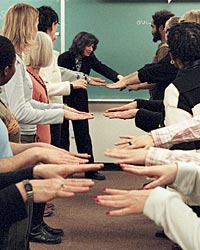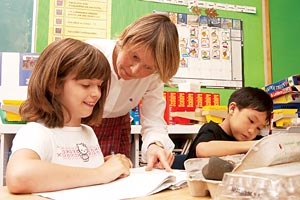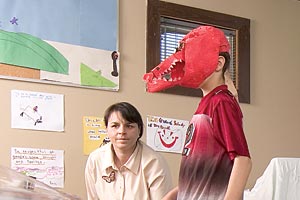
State of the Teaching Profession 2005:
What matters?
Ontario educators laud contracts in the drive for stability, but other issues still loom
by Brian Jamieson
Survey Results
A Dream Trip
Teacher Hugh Dale-Harris is one of five who retraced - on skis and by dog sled - Peary's trip to the North Pole
by Beatrice Schriever
Playing to Learn
Drama AQ produces results for teachers across many disciplines
by Gabrielle Barkany
Consider the Possibilities
The world is their classroom
by Alan Travers
Playing to LearnWhen students enrolled in the Additional Qualification dramatic arts course at OISE last year, they knew the course was designed to assist teachers at all grade levels. But those attending were not just English and drama specialists. They hoped to apply drama techniques in a wide range of subjects and classrooms.by Gabrielle Barkany |
 |
On Wednesday evenings from October through March last year, I attended classes - along with teachers from various boards and disciplines - at OISE in pursuit of my Additional Qualification in dramatic arts. This may not be everyone's idea of a fun night out after a full day's work, but my classmates and I found the evening energizing and rewarding.
For Trina Wasilewski, an elementary school consultant (Special Education) with the Toronto DSB, the demands on her time were manageable because the course was so much fun.
"To me it was an opportunity to get together, get to know colleagues in a fun environment," she says. And the humour of course instructor Larry Swartz contributed to this positive assessment.
"As much as it was difficult some days to attend, especially when it was a really tough day at school," adds Jill Kearns, a behaviour specialist teaching Grades 7 and 8 at Fern Avenue Public School, "it was refreshing to share successes and failures with other colleagues."
"It's enriching," says Pascale Salvail, a Special Education teacher in the French Immersion program at Lester B. Pearson Elementary School. The time with other teachers was especially important: "We exchange ideas and I can apply them the very next day."
And the payoffs, says Kearns, are immediate. "Every time I bring a new strategy to class, I see the students' faces changing, as they are so excited."
Learning in action
Bob Stronach, in his fourth year of teaching Grade 8 science (as well as English, math and drama) has found drama to be a great advantage in his classes - one that is particularly useful with students at this age.
"Grade 8 students often don't know or have forgotten how to play," says Stronach. "But drama is about playing in a constructive way. Role-playing is something we should bring in as much as possible."
 |
Bob Stronach - Annette Public School |
Stronach takes particle theory - an important part of the Grade 7 science curriculum - as an example. He had his students get up and pretend they were parts of a particle.
"If they represent a solid, they are close together and move slightly. If they are water, they are moving around more randomly, hitting each other slightly. If they are gas, they will move quickly around the room, bouncing off one another randomly."
“ making it tangible with the thing they know most – themselves ”
When his students got up from their desks and got active, they were energized and became part of what he was trying to teach. The goal is to have students understand an abstract concept.
"By making it tangible with the thing they know most as tangible - themselves - they become the abstract concept. They learn and understand it because they are it."
Second-language learning
Pascale Salvail, a Special Education specialist in the French Immersion program at Lester B. Pearson Elementary School, is in search of new strategies for responding to different learning styles and to help the language come alive for her students. As with many immersion programs, she hears students in her school switch to English as they pass the threshold of the classroom.
 |
Pascale Salvail - Lester B. Pearson Elementary School |
"For students to use French spontaneously, it must be part of their social environment," says Salvail. "Because drama has a social aspect it encourages language development and integration. The activity is alive and interactive."
Integrating drama into story time, Salvail will stop during the story and ask students to pretend to be one of the characters - perhaps describing what the character is feeling - and then write what their character might say or do.
“ I bring a new strategy to class and see the students
faces... they are so excited. ”
One boy in Grade 2 spoke very little and was usually reluctant to write, but his eyes lit up. He asked, "Madame, do you mean we can write whatever we want?" He pretended to be a wise old man who was talking to thieves and wrote a very long text.
"He was totally engaged," Salvail says. "He felt free. He was able to focus on the story rather than on a French lesson where he had to find the correct answer, the right word."
Social development
For students with a multitude of exceptionalities and various social, emotional and behavioural issues, Trina Wasilewski, an elementary school consultant (Special Education) with the Toronto DSB finds that drama helps significantly. It is directly applicable in teaching social skills, such as how to make eye contact, join in a group, communicate clearly and build self-esteem.
"I learned so many strategies for dealing with bullying," say Wasilewski about this AQ course. "And I can adapt to learning styles to respond to students' needs."
 |
Jill Kearns - Fern Avenue Public School |
A number of Kearns's students have learning disabilities. They have a hard time expressing themselves and staying motivated.
"They find it very difficult to keep up textbook learning," says Kearns. "Drama - writing in role and role-playing activities - seems to give them more ownership of their learning. They connect with others and have fun."
Kearns used role-playing to turn things around for current events, when students were to find newspaper articles and write summaries.
“ as kids are changing we are too . I can relate better to what my students are going through. ”
"It had been a struggle for them," she recalls. "They hated it, hated reading the newspaper and reporting."
But when she asked each student to assume a role in a newscast - producer, anchor and sportscaster - they loved it. "I taped the newscast to make the activity more meaningful to them," says Kearns. "Now they are actually smiling when they do their research - and they've improved their reading and writing skills. They feel wonderful while engaged in their work. They are less embarrassed to speak in front of a crowd. News stories also helped them to feel more empathy for others.
"I can only thank drama for all that because it gave me the motivation and ideas that I could implement in my class. Before, they were saying, 'Oh no, not current events.' Now, they ask, 'Are we doing current events today, Ms. Kearns?'"
Teachers learning
As I delved deeper, I found that the enthusiasm of my classmates was not limited to the current drama course. These are lifelong learners.
Stronach has also taken Special Education, Part 1 and Environmental Science, Part 1 and says that in all three courses his goal was not necessarily to be qualified in those specific areas.
"I am learning different perspectives and teaching strategies that can be integrated in any of the classes I am teaching," he says. "Courses help me to be a more fulfilled, all-round teacher. The next course I am interested in is Design and Technology."
 |
Elementary School Consultant Trina Wasilewski |
Salvail has taken the three-part course for Français (langue seconde) as well as the second and third parts of Special Education, which have helped her to respond to students' differing needs. "Next, I plan to pursue the Principal's Qualification courses."
As an elementary school consultant, Wasilewski knows the importance of extending what she learns to students and colleagues. "It comes down to: How can I make it better for the students?"
“ Now they are actually smiling when they do their research. ”
Kearns plans to do Dramatic Arts, Parts 2 and 3 as well as the Special Education class. "Learning never stops," she says. "As kids are changing, we are too. We have to. If you stop learning you become stagnant, students will suffer and you can become bitter in the teaching profession.
"I need to get new ideas to keep my teaching fresh and real. And as a constant student I can relate better to what my students are going through. The ongoing learning is essential. I could certainly establish a program and regurgitate it each year but I would stop my students and myself from having fun.
"For me, learning is fun. I want students to see what they have gained, what they have accomplished."
Additional Basic Qualification - Drama Part I
College member and Bilingual Communications Officer Gabrielle Barkany took an Additional Basic Qualification course (ABQ) at the Ontario Institute for Studies in Education, University of Toronto (OISE/UT) during 2004-05.
The 125-hour course, spread over eight weeks, includes participation in a range of drama activities such as in-class readings, seminars and discussions, play visits, planning and presenting drama work, homework reading and assignment writing. It covers games, movement, role-playing, storytelling, writing in role, improvisation, inter-pretation and presentation. Participants plan drama lessons and implement assessment strategies.
The course covers a curriculum for children and adolescents that helps them develop to the limits of their potential - responding intellectually, physically and emotionally to a variety of imagined situations. As an art form and as an integrative methodology for learning across the curriculum, drama - through talk, writing, art, movement and role-playing - provides a framework for teaching and learning.
Teaching strategies are explored that can help guide all children to imagine, explore, enact, communicate and reflect on concepts and feelings at their own level of development.
Barkany's principal instructor was Larry Swartz, a curriculum instructor and principal of the dramatic arts Additional Qualification course at OISE/UT. The other instructors for this section were Christine Jackson, a drama and dance instructional leader, and Deborah Nyman, who also teaches dramatic arts in a Toronto DSB secondary school.





